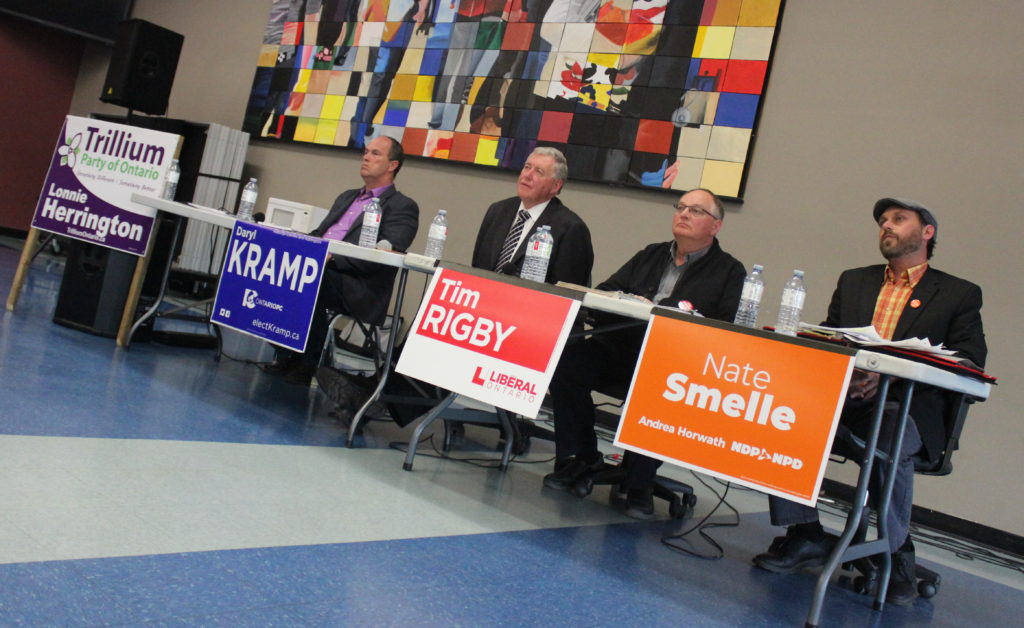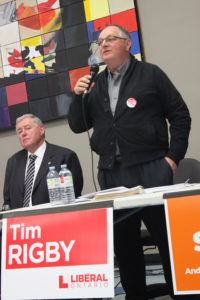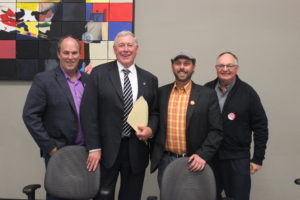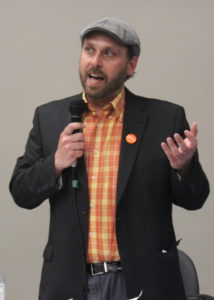|
Bancroft this Week https://www.bancroftthisweek.com/candidates-debate-kramp-says-pcs-will-fire-hydro-ceo/ Export date: Mon Mar 31 19:26:39 2025 / +0000 GMT |
Candidates debate, Kramp says PCs will ‘fire’ hydro CEO From left, provincial riding candidates Lonnie Herrington for the Trillium Party of Ontario, Daryl Kramp for the Conservatives, Tim Rigby for the Liberals and Nate Smelle for the NDP hear questions from the public regarding their parties' platforms at an all-candidates meeting held at North Hastings High School May 22. / SARAH SOBANSKI Staff By Sarah Sobanski North Hastings residents want concrete answers — not “fluffy” ones — from their MPP candidates. After the area's first provincial all-candidates meeting, it's clear Trillium Party of Ontario candidate Lonnie Herrington, PC candidate Daryl Kramp, Liberal candidate Tim Rigby and NDP candidate Nate Smelle are going to have to work for votes in the north of the riding. Education, poverty and hydro were just a few hot topics for voters who gathered at North Hastings High School for the meeting May 22. It was hosted by the education workers of local federations and unions. First off were pre-moderated questions. The education workers had concerns about school funding, classroom support, violence and mental health issues in schools and the right to go on strike. While Rigby pointed out the current provincial government had “embarked on the largest school building program in the province's history” and “overhauled” the school accommodation and capital needs assessment process, Herrington suggested the current government would rather close schools than address their needs.  Right, riding MPP Liberal candidate Tim Rigby defends the current provicial government following criticism from MPP Conservative candidate Daryl Kramp, left. Rigby would later say his party's greatest weakness was failing to communicate its accomplishments with the public, such as those gathered at North Hastings High School for the all-candidates debate May 22. / SARAH SOBANSKI Staff Smelle said he saw “neglect” in the current funding model. He said his party planned to scrap it and “create something that works… based on actual needs and not numbers.” He was applauded by the audience. “Rural schools are absolutely disadvantaged,” Kramp said when it was his turn at the mike. He proposed a panel to make funding decisions and implement them within six months of the election, should the Conservatives win the majority. These would include finding efficiencies in the education budget and administration. When it came to mental health and violence, Kramp said issues in the home lead to issues in schools. “Society has been changing so badly,” he said. “A lot of it starts at home… [with] discipline… [and] respect.” Herrington would later agree. He also touched on finding efficiencies. During his introduction, Herrington noted the Trillium Party of Ontario was a conservative party. He often agreed with Kramp throughout the debate. Following the debate however, spectators told Bancroft This Week they were skeptical of the party's claims. One woman suggested she saw the party as a “far right” group. Rigby touched on his experience as a high school teacher when discussing education concerns. He said “EAs are often facing the brunt” of violence in schools, as such the Liberals were providing programs to help them prepare for violence in schools. Each candidate said they would commit to hiring more EAs but Kramp noted parties could only pressure school boards to hire them. Smelle said violence and mental health issues went back to his party's platform to create a funding model that better addressed school needs. He noted, however, that the NDP also planned to create a ministry dedicated solely to mental health. When it came to going on strike, Smelle said school staff should have the right to strike. “It's a matter of standing with them,” he said. Herrington countered that he believed in looking after all Ontarians. He said teachers had the ability to hold parents and children “hostage” with strike threats. He said that would change with declaring teachers an essential service. Both Rigby and Kramp said they believed in the collective bargaining process as it stood. It was then that the floor opened for questions from the audience. Spectators demanded “yes or no” answers on more than one occasion and some directed their questions at specific candidates, calling out their parties and platforms. On issues of poverty, Smelle said the NDP's platform was the strongest. He said his party planned to build 65,000 affordable housing units and would introduce universal dental and pharmacare plans.  From left, Trillium Party of Ontario riding MPP candidate Lonnie Herrington, provincial Conservative candidate Daryl Kramp, provincial NDP candidate Nate Smelle and provincial Liberal candidate Tim Rigby prove political rivals can still be civil by posing for a picture together following the all-candidates debate. “We can't afford to let people get sicker,” he said noting this plan would help alleviate future health-care costs, the most expensive sector for the province, and keep the province from incurring more debt. He also said the party would increase taxes for higher income earners. Kramp had plans for affordable housing as well. He said the Conservatives had to get rid of building “red tape” that made what should be quick building projects take years to complete. He said he wanted more homes on the market so housing costs could come down. Herrington said the Trillium Party didn't have a platform for affordable housing, but that it planned to bring back jobs to help people out of poverty. Rigby noted his government had brought in Ontario's Fair Housing Plan and the standard lease to help renters. When it came to social assistance rates, Smelle and Kramp said they would raise rates. Smelle said he was very aware of rural poverty and was currently preparing a report on it for his party. Kramp noted the government couldn't just raise rates, it also had to look at reducing costs and the discrepancy between what families earn in rural areas versus what they earn in urban centres. Rigby pointed out the Liberal government was piloting a basic income project and was working on issues of poverty across the province. Voters didn't leave hydro out of the conversation, a large contributor to poverty in its own right. One resident skeptically asked Smelle how the NDP planned to live up to promises of cutting hydro bills to make them more affordable. Smelle said the party wanted to buy back hydro so that it owned the majority share, but Herrington said that was “insane” and impossible. Herrington and Kramp said their parties would look to bring down hydro bills in other ways. Herrington would see the “Niagara tunnel” turned back on and Kramp would “stop the bleeding” by cutting green energy contracts.  Riding MPP NDP candidate Nate Smelle defends the term “sanctuary province” after an audience member questions his party's platform and suggests it will leave borders open to anyone, even those who don't need help. Smelle said the question was a classic example of “cherry picking” single words out of context from a party platform to spread misinformation. / SARAH SOBANSKI Staff Kramp also threatened that the PCs would put directors in place that would fire Hydro One's CEO and stop giving out salary increases. Smelle agreed that the CEO's salary would be on the chopping block should the NDP be elected. Rigby asked the public to remember where hydro had been in the province in the '90s. He said delivering reliable hydro was complicated and while the Liberals had made some mistakes, it had also had many successes. Nearing the end of the debate, a resident brought up Conservative party leader Doug Ford. His question was later followed by what candidates saw as their party's weakness. Kramp said he didn't care about who his party leader was. He said he was there to represent the people of his riding and their views, regardless of who sat in the hot seat. He noted, however, that his party was too “Toronto-centric.” He said the rural part of the riding hadn't been treated fairly and that being an MPP was all about representation. “We have to spend more time listening than talking,” he said. Following Kramp, Rigby noted his own controversial party leader, Premier Kathleen Wynne. He said the Liberals' greatest disadvantage was that they had poorly communicated their many successes, such as this year's “balanced” budget. He said he believed in Wynne and that she was leading the province with the most progressive government in the province's history. Smelle said he was happy his party wasn't led by Ford or Wynne. He noted, however, that he was tired of hearing about former premier Bob Rae. “He's a Liberal now,” he said, and a classic example of “tr[ying] to do too much, too fast.” He added that his party was the only party presenting a “revolutionary” platform where others were looking to continue with “business as usual.” Herrington said the Trillium Party's greatest strength was also its greatest weakness. It looked after issues of every Ontarian, but didn't have enough manpower to cover 100 per cent of Ontarians' issues. Election day is June 7. |
| Excerpt: North Hastings residents want concrete answers — not “fluffy” ones — from their MPP candidates. |
|
Post date: 2018-05-30 12:51:12 Post date GMT: 2018-05-30 16:51:12 Post modified date: 2018-05-30 12:53:26 Post modified date GMT: 2018-05-30 16:53:26 |
|
Export date: Mon Mar 31 19:26:39 2025 / +0000 GMT This page was exported from Bancroft this Week [ https://www.bancroftthisweek.com ] Export of Post and Page has been powered by [ Universal Post Manager ] plugin from www.ProfProjects.com |